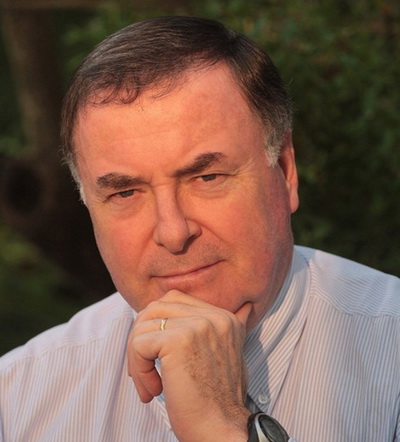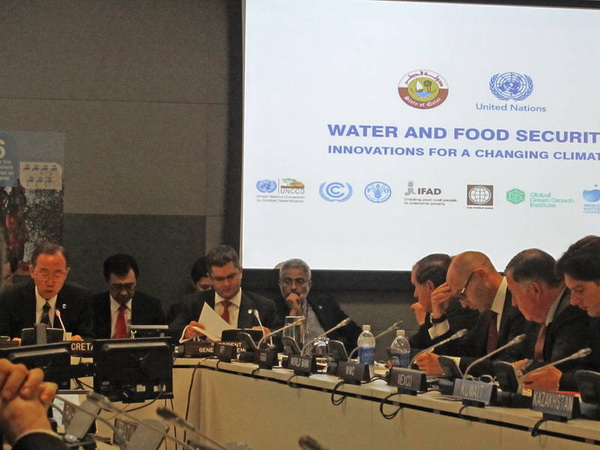

Loïc Fauchon obtained a post-graduate degree in Political Sciences (international relations section) from the Institute of Political Studies of Aix-en-Provence, France and a diploma in higher economic studies at the faculty of economic sciences of Aix in 1970. In 1972, he earned a doctorate (Ph.D) in economics and law. From 1980 to 1983, he joined the Regional Council of Provence-Alpes-Côte d'Azur, first as a Project Officer in the President's office, then as Director of this office. From 1983 to 1986, he was the Assistant Director in the Mayor's office of Marseilles, France. From 1986 to 1991, he worked as Assistant Secretary General of the City of Marseilles. In 1991, he joined the General Management of the Marseilles Water Supply Company (SEM) and became President-General Director in 1997. He has been a Governor of the World Water Council since 2000, first as a special advisor to the President, then as Vice-President from October 2004, and finally as President from March 18th, 2005 to November, 2012.
On Sept. 27th, Mr. Fauchon was invited to attend the special seminar of “Water and Food Security” of the 67th Session of the United Nations General Assembly High Level Meetings. UN Secretary General Ban Ki-moon was also present and made a speech. Following is a courtesy translation of Mr. Fauchon’s speech at the seminar, in which he proposed the concept of “Water Security Pact”. During his speech, he called upon all international organizations, governments and all components of civil society to participate in the Pact, asked all States to enshrine the Right to Water within their Constitutions. He further pleaded to the States to adopt or amplify national or local policies for water demand and create a ‘water-energy’ package to ensure that the Post-2015 Sustainable Development Goal on water and sanitation can be shaped.
The address given by Loic Fauchon is as follows:
67th Session of the United Nations General Assembly
High level meeting
27 September 2012
WATER AND FOOD SECURITY MUST BE AT THE HEART OF CLIMATE TALKS
CALL FOR A PACT FOR WATER SECURITY
ADDRESS BY LOIC FAUCHON
PRESIDENT
WORLD WATER COUNCIL
Mr Secretary-General,
Your Highness,
Ministers,
To all of you, dear friends of water,
Good evening,
Ladies and Gentlemen, the world today is witnessing one crisis after another; crises which are political, economic, but also climatic, hydric, health and food related. Billions of inhabitants of this world suffer deeply from the combined impact of these crises.
The interdependence of economies, growing circulation of information, and reckless globalisation contribute to increasing this often cruel reality.
In order to answer the permanent concern expressed by world populations, meet their desire to see their standards of living increase and their consumer needs satisfied, there is only one path: development, because development means growth but also hope for peace and dignity.
But of course, we’re talking about a development where the benefits can be shared between all; in short, truly equitable and sustainable development.
Gathering here so many distinguished people in such a prestigious place to talk about the linkages between climate change, water and food is an exceptional opportunity.
The World Water Council, which I represent, would like to express its gratitude to the Qatari authorities and the UN administration for their invaluable initiative and kind invitation.
Yes, you know that a part of humanity suffers from hunger, thirst and illnesses, in a world where natural resources are suffering from increasing scarcity, while at the same time the population is growing.
Water is one of the resources which have become scarce. Scarce in quantity and scarce in quality, because of demographic growth, urban concentration along rivers and coastlines, domestic and chemical pollution, and increasing frequent droughts.
Considering this, how is it possible that water is not at the heart of discussions on climate change? Water cannot be a side element of climate negotiations. On the contrary, it should be one of its pillars, and one of its most important ones.
We are faced with many responsibilities. In order to meet growing needs and face water stress which is threatening, we must plead for additional water resources to be made available. We must increase water supply, and be confident in the genius of the human mind and technological progress.
Tomorrow, even more than today, it will be essential to store water, transfer it, desalinate it, pump it, and recycle it. But it will not be enough. We shall stop wasting water. We shall stop water plundering.
Yes, ladies and gentlemen, the time of easy water is over. A new policy is needed which can no longer be avoided. It will change the relationship between man and water. This new policy is aimed at changing our behaviours, at controlling the different ways in which water is used, at regulating demand.
Time has come to consume less and manage better. Our duty is to increase, what I would like to call “water drop productivity”.
The safeguard of water, its availability, the way it is used and treated, urges us to put a stop to the “suffering of water”. Water security is now part of the strategic challenges for tomorrow’s world along with nuclear, food and maritime security.
Water security is first and foremost the capacity to guarantee the basic needs for a decent everyday life, to guarantee water to feed the planet’s population and increase agricultural performance. And at the same time, to guarantee clean water in order to reduce waterborne diseases, which are still one of the leading causes of death worldwide.
Forgetting the linkages between food and health, means taking the risk to let those we have fed die.
Secondly, water security means economic and social security which will produce the goods and services which are necessary for development and the improvement of living standards.
Thirdly, water security also means ecological safeguard in order to restore to nature the water that is essential to the preservation of biodiversity and maintenance of ecosystems.
Ladies and gentlemen, the time for wishful thinking is over, and now is the time for action, commitments and solutions. This is why the World Water Council calls upon all parties to be associated to a Pact for Water Security.
Today, we are making an appeal to all international organisations, governments, parliamentarians, local authorities, economic leaders, all components of civil society, to participate in this Pact for Water Security by implementing six core commitments:
- First commitment, symbolic but essential: we ask each State to enshrine the Right to Water in its constitution. So far, some forty States only have taken this decision;
- The second commitment is to ask each State, each local authority to recognise water and sanitation as a great public cause and budgetary priority;
- The third is to adopt or amplify national or local policies for water demand regulation in order to reduce water consumption and ensure better governance;
- The fourth is to support the creation of a “water-energy package” and the creation by 2015 of a global water and energy fund: dedicated to “water for food” - to develop local agriculture - and to “water for health” - to drastically reduce the number of deaths caused by waterborne diseases;
- The fifth commitment would be to ensure the compulsory creation of taps and toilets in every school which is created or renovated;
- The sixth commitment would be to ensure that a post-2015 Sustainable Development Goal on water and sanitation be created when the current Millennium Development Goals are replaced.
Ladies and gentlemen, an enormous challenge is ahead of us, it is a great human adventure.
By taking into account the future of water in view of climate evolution, by guaranteeing its availability, its purposes, we will guarantee food and health security.
It is our responsibility, a huge responsibility. All together, we are going to share this message, and promote this Pact.
Let us give water a chance. By doing so, together we are going to secure water for a safe world.
Thank you for your attention.

